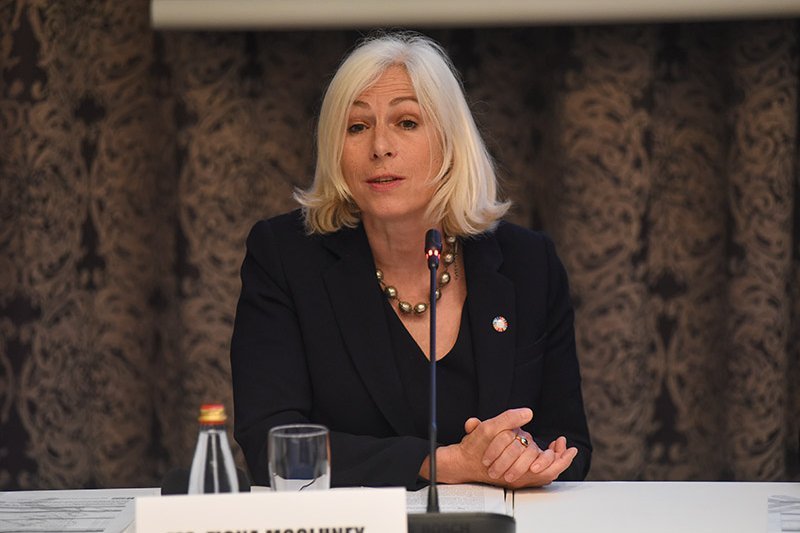Multilateral Solutions for a Better Tomorrow
Albanian Daily News: Ms. McCluney, thank you for accepting this interview to discuss the United Nations General Assembly (UNGA), which started this Tuesday, September 10, 2024, in New York. What makes this year's UNGA session particularly important?
Fiona McCluney: Thank you for having me. I am very pleased to brief your newspaper again this year on the eve of the 79th session of the UN General Assembly in New York. It’s an important global moment when the 193 Member States of the United Nations convene. A moment for multi-lateral dialogue framed by the messages of Member States and the Secretary General. This year the debate will focus on the critical moment we are at regarding the 17 Sustainable Development Goals (SDGs), urging countries to move beyond acknowledging what needs to be done to achieve the SDGs with a focus on how to achieve them. Secondly, there will be a call to nations to commit firmly to peace and security given the current complex global conflict landscape and efforts to build consensus around reform of the multilateral system including international financial architecture. New to the debate, in anticipation of a Member State focus on new technologies - particularly artificial intelligence (AI) - is a discussion on how AI presents risks, if unregulated, but also has immense potential to accelerate sustainable development.
These pressing issues will be central to the Summit of the Future (SoF) taking place on September 22-23. As Secretary-General Guterres has described it, the Summit of the Future is “a chance to build more effective and inclusive institutions and tools for global cooperation, adapted to the 21st century and our multipolar world.”
Summit of the Future will bring together world leaders and Member States to discuss and agree on concrete actions and deliberations under a Pact for the Future, a Declaration on Future Generations, and a Global Digital Compact—agreed by the end of the Summit. Member states are currently negotiating these documents, a process that began earlier this year. Before SoF, the Secretary-General will host the Summit of the Future Action Days on September 20-21 to further engage stakeholders and advance the pledges made around different courses of action.
The traditional General Debate will occur from September 24-28 and again on September 30, featuring high level statements by heads of state and government under the theme "Leaving No One Behind: Acting Together for the Advancement of Peace, Sustainable Development, and Human Dignity for Present and Future Generations."
Other key events on the UNGA calendar include the High-Level Meeting on Sea-Level Rise on September 25 and the High-Level Meeting on Antimicrobial Resistance (AMR) scheduled for September 26. This meeting aims to advance global efforts against AMR by strengthening health systems, promoting responsible antimicrobial use, and fostering international cooperation.
Albania is once again actively contributing to global discussions, including through hosting a side event with UNFPA, to which member state representatives will be invited under the theme: “Unpacking the Pact of the Future: Realizing Potentials and Strengthening Social Cohesion”.
-Ms. McCluney, what impact and effects will Summit of the Future have on people? Can you provide some concrete actions expected to follow up on SoF?
-From the Summit of the Future, a negotiated document, the Pact for the Future, is agreed. The idea for this Summit was first proposed by UN Secretary-General António Guterres in his "Our Common Agenda" report in September 2021. In February 2023, Guterres released 11 policy briefs offering "concrete ideas" on how to advance Our Common Agenda as Member States prepare for the Summit.
These documents are publicly available, and I encourage interested readers to visit the Summit of the Future website (un.org/summit-of-the-future) for more information, especially on topics of particular interest. The 11 policy briefs expected to translate into actions are:
1. The needs of future generations; 2. Improving the international response to complex global shocks through an emergency platform; 3. More systematic participation by young people in decision-making processes; 4. Metrics that go beyond gross domestic product; 5. Global digital cooperation on maximizing and sharing the benefits of digital technology through a global digital compact; 6. Reform of the global financial architecture; 7. The peaceful, secure and sustainable use of outer space; 8. A New Agenda for Peace; 9. Information integrity; 10. Transforming education; and 11. UN 2.0: adapt basic UN practices on data, communications, innovation, strategic foresight, performance and results.
Secretary-General Guterres has emphasized that he expects the Summit of the Future to be an opportunity to reboot multilateral collaboration for the 21st century, also highlighting that respect for human rights and efforts to address gender equality are essential pillars to achieving concrete actions.
-What about climate change?
-Unfortunately, the latest news is not promising. According to a recent report from the World Meteorological Organization (WMO), there is an 80 percent likelihood that the annual average global temperature will temporarily exceed 1.5°C above pre-industrial levels for at least one of the next five years.
A central theme of the Summit of the Future in New York this September is the trade-off between development and climate action. The summit will focus on integrating climate action with development efforts rather than treating them as separate or conflicting priorities. This means aligning development projects with climate goals. For example, how can we promote economic growth in an environmentally sustainable manner? One approach is to encourage green investments and technologies that reduce carbon emissions while creating economic opportunities.
Albanian Daily News: Thank you, Ms. McCluney, for this interview. / ADN













